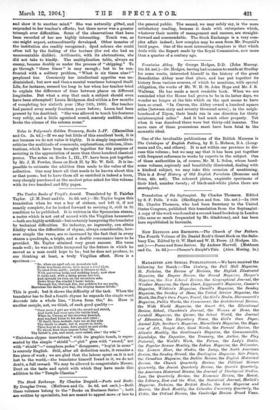The Twelve Books of Virgil's Aeneid. Translated by E. Fairfax
Taylor. (J. M. Dent and Co. is. 6d. net.)—Mr. Taylor began this translation when he was a boy of sixteen, and left it, if not exactly complete, for he looked forward to revising it, still in fit condition to be published. It is written in the Spenserian stanza, a metre which is not out of accord with the Virgilian hexameter —both are highly artificial—but certainly hampering the translator by technical difficulties. No industry, no ingenuity, can attain fidelity when the difficulties of rhyme, always considerable, how- ever simple the verse, are so increased by the fact that in every stanza a quadruple, a triple, and a double consonance have to be provided. Mr. Taylor attained very great success. His verse reads well ; he was as little hampered by the fetters in which he moved as a man could hope to be; but he does not produce, to our thinking at least, a truly Virgilian effect. Here is a specimen :— "So, when an aged ash on mountain tall
Stout woodmen strive, with many a rival blow, To rend from earth ; awhile it threats to fall,
With quivering locks and nodding head; now slow
It sinks and, with a dying groan lies low
And spreads its rain on the mountain side.
Down from the citadel I haste below.
Through foe, through fire, the goddess for my guide. Harmless the darts give way, the sloping flames divide."
This is good; but it shows the difficulty of the task. When the translator has to find a fourth rhyme he expands the single word descend° into a whole line, "Down from the," &c. Here is another sample, not, we think, of such good quality :— "Once more I girt me with the sword and shield,
And forth had soon into the battle hied,
When lo, Cream at the doorway bieeled,
And reached lulus to his sire and cried : 'It death thou seekest, take me at thy side Thy death to share, but if, expert in strife, Thou hop'st in arms, here guard us and abide. To whom dost thou expose lulu? life, Thy father's, yea, and mine, once called, 83as I thy wife.'"
" Sinistram clypeo insertabam," with its graphic touch, is repre- sented by the simple "shield"—" girt" goes with "sword," not with " shield "—" complex& pedes " disappears; " hop'st in arms" is scarcely English. Still, after all deduction made, it remains a fine piece of work ; we are glad that the labour spent on it is not lout to the world,—the translator himself found in it, we do not doubt, a full reward. We may be allowed to congratulate Messrs. Dent on the taste and spirit with which they have made this addition to the "Temple Classics."










































 Previous page
Previous page